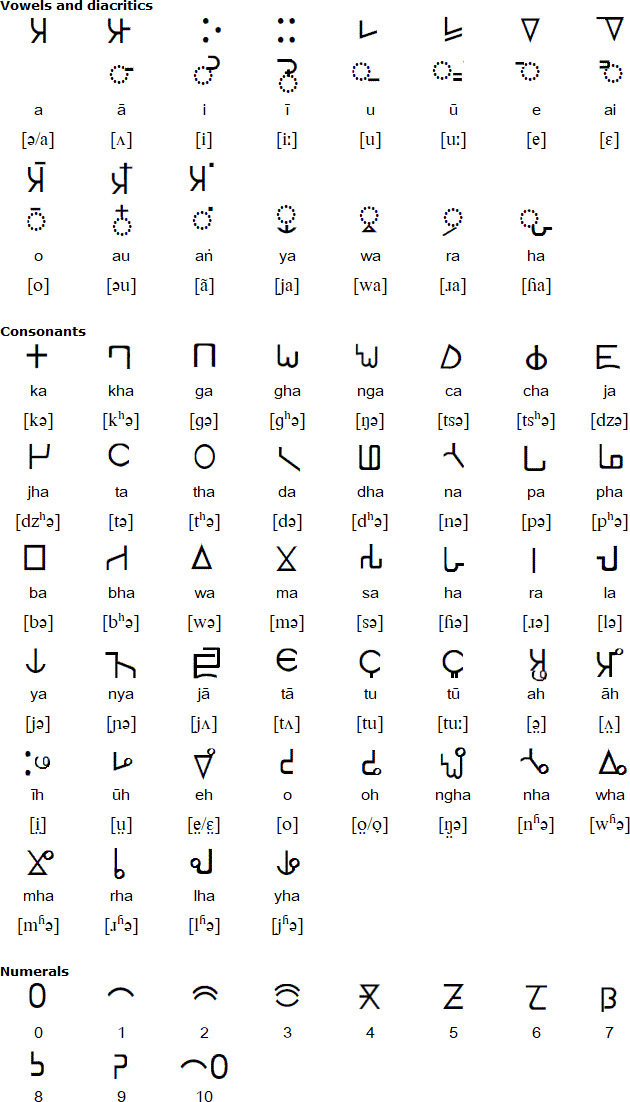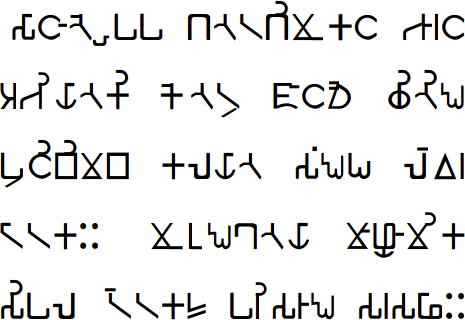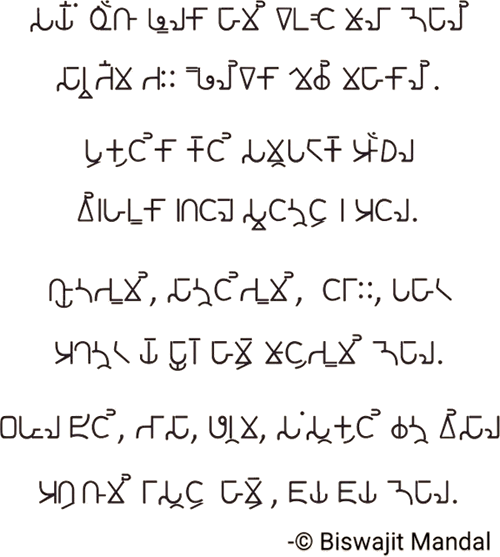The Magar Akkha script is a version of the Brahmi script, that has been used since about the 11th century AD. It is still used to some extent to write Magar, a Tibeto-Burman language spoken in parts of Nepal, and northeast of India. It is taught in some schools and used in one newspaper. These days, the Devanagari script is more commonly used to write Magar.
Magar Akkha is also known as Magar Akkha Rika or Magar lipi.

Download an alphabet chart for Magar Akkha (Excel)


सयौं थुँगा फूलका हामी, एउटै माला नेपाली
सार्वभौम भई फैलिएका, मेची-महाकाली।
प्रकृतिका कोटि-कोटि सम्पदाको आँचल
वीरहरूका रगतले स्वतन्त्र र अटल।
ज्ञानभूमि, शान्तिभूमि, तराई, पहाड, हिमाल
अखण्ड यो प्यारो हाम्रो मातृभूमि नेपाल।
बहुल जाति, भाषा, धर्म, संस्कृति छन् विशाल
अग्रगामी राष्ट्र हाम्रो, जय जय नेपाल।।
Woven from hundreds of flowers, we are one garland that's Nepali,
Sovereignly spread across from Mechi to Mahakali.
A shawl of unending natural wealth,
From the blood of the braves, a nation free and immovable.
A land of knowledge and peace, the plains, hills and mountains tall,
Unscathed, this beloved land of ours, O motherland Nepal.
Diverse races, languages, religions, and cultures of incredible sprawl,
This progressive nation of ours, all hail Nepal!
Details provided by Biswajit Mandal (biswajitmandal[dot]bm90[at]gmail[dot]com)
Information about Magar Akkha
http://www.unicode.org/L2/L2011/11144-magar-akkha.pdf
https://gorkhatimes.wordpress.com/category/gorkhali-scripts/
https://www.atoznepal.info/categories/nepali-language/about-magar-akkha-script-is-it-a-part-of-brahmi-script
Ahom, Aima, Arleng, Badagu, Badlit, Basahan, Balinese, Balti-A, Balti-B, Batak, Baybayin, Bengali, Bhaiksuki, Bhujimol, Bilang-bilang, Bima, Blackfoot, Brahmi, Buhid, Burmese, Carrier, Chakma, Cham, Cree, Dehong Dai, Devanagari, Dham Lipi, Dhankari / Sirmauri, Ditema, Dives Akuru, Dogra, Ethiopic, Evēla Akuru, Fox, Fraser, Gond, Goykanadi, Grantha, Gujarati, Gunjala Gondi, Gupta, Gurmukhi, Halbi Lipi, Hanifi, Hanuno'o, Hočąk, Ibalnan, Incung, Inuktitut, Jaunsari Takri, Javanese, Kaithi, Kadamba, Kamarupi, Kannada, Kawi, Kharosthi, Khema, Khe Prih, Khmer, Khojki, Khudabadi, Kirat Rai, Kōchi, Kodava Lipi, Komering, Kulitan, Kurukh Banna, Lampung, Lanna, Lao, Lepcha, Limbu, Lontara/Makasar, Lota Ende, Magar Akkha, Mahajani, Malayalam, Meitei (Modern), Manpuri (Old), Marchen, Meetei Yelhou Mayek, Meroïtic, Masarm Gondi, Modi, Mon, Mongolian Horizontal Square Script, Multani, Nandinagari, Newa, New Tai Lue, Ojibwe, Odia, Ogan, Pahawh Hmong, Pallava, Phags-pa, Purva Licchavi, Qiang / Rma, Ranjana, Rejang (Kaganga), Sasak, Savara, Satera Jontal, Shan, Sharda, Sheek Bakrii Saphaloo, Siddham, Sinhala, Sorang Sompeng, Sourashtra, Soyombo, Sukhothai, Sundanese, Syloti Nagri, Tagbanwa, Tai Noi, Takri, Tamil, Tanchangya (Ka-Pat), Tani, Thaana, Telugu, Thai, Tibetan, Tigalari, Tikamuli, Tocharian, Tolong Siki, Vatteluttu, Warang Citi
Page last modified: 16.03.23
[top]
You can support this site by Buying Me A Coffee, and if you like what you see on this page, you can use the buttons below to share it with people you know.

If you like this site and find it useful, you can support it by making a donation via PayPal or Patreon, or by contributing in other ways. Omniglot is how I make my living.
Note: all links on this site to Amazon.com, Amazon.co.uk
and Amazon.fr
are affiliate links. This means I earn a commission if you click on any of them and buy something. So by clicking on these links you can help to support this site.
[top]